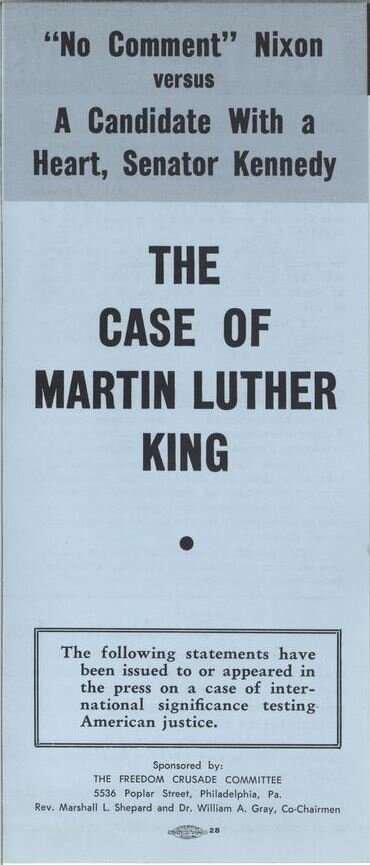Action x Perception = Victory
Action is invaluable.
Politicians don’t win elections without action. Entrepreneurs won’t start companies without action. Charities can’t raise money without action.
But action alone doesn’t guarantee victory.
The giants among us understand one thing about action: it’s most effective when leveraged with perception.
Perception is a catapult for action. Perception is the window through which the world observes our actions. Like a sculptor chiseling chips from a block of marble, perception gives meaning to action.
John F. Kennedy’s campaign team used perception as a powerful lever to lift him to victory in 1960.
With election day quickly approaching, Kennedy knew he needed the black vote to win. The challenge of winning the black vote was not simultaneously losing the white vote. Kennedy couldn’t make public appearances championing civil rights. He couldn’t promise a black cabinet member. He couldn’t hold meetings with Martin Luther King Jr. All these actions would’ve cost him white votes.
Kennedy needed to leverage his limited action to win the black vote. He needed the subtle power of perception to turn the tides.
With the timing of a royal flush when the rent is overdue, Kennedy received a last minute gift - Martin Luther King Jr. was arrested in Atlanta.
The arrest was uneventful. It wasn’t his first. It wouldn’t be his last. King was carried in cuffs from a whites only lunch counter in a department store. King and three dozen others found themselves in an Atlanta jail cell, accepting imprisonment over paying bail. They resolved only to leave when the charges were dropped.
Shortly afterward, the charges were dropped and everyone was released - everyone except King. He was held on a bogus bench warrant from a minor traffic infraction several months earlier. Then, in the middle of the night, King was transferred from the county jail to a maximum security prison. His family was distraught over the unfair treatment.
This sequence of events was the perfect opportunity for Kennedy to win black votes. On the advice of his campaign advisors, Kennedy called King’s wife, Coretta.
Kennedy’s kind words calmed Coretta. “I just wanted you to know that I was thinking about you and Dr. King,” he said. “If there is anything I can do to help, please feel free to call on me.”
That was it. A two minute phone call. A tiny action. It was essentially an empty offer, but to Coretta and the rest of the King family, it meant the world.
Around the time of JFK’s call, his brother and campaign manager, Robert, was also on the phone. He called the judge in King’s case and strongly expressed his opinion that any decent judge would release King by sundown - and that’s exactly what happened.
The tides of the black vote were turning. Upon King’s release, his father, a lifelong Republican, announced his plans to vote for Kennedy.
“It took courage to call my daughter-in-law at a time like this,” said Daddy King. “He has the moral courage to stand up for what he knows is right. I’ve got all my votes and I’ve got a suitcase, and I’m going to take them up there and dump them in his lap.”
As a prominent figure in the black community, Daddy King’s words carried weight. His words painted a positive perception of Kennedy, leveraging the action of one tiny phone call to an election changing outcome.
The Kennedy campaign cashed in on the momentum of Daddy King’s words. Unbeknownst to JFK, his campaign began printing what came to be known as the “blue bomb.” It was a small blue pamphlet filled with quotes from the King family about JFK’s call to Coretta.
The pamphlet was sponsored by a dummy committee of preachers, so it couldn’t be traced to the campaign. It was distributed through black churches on the Sunday before election Tuesday, and it wasn’t mentioned in the press - a deliberate strategic move to reduce the number of white people who saw it.
Known familiarly as “the blue bomb,” the pamphlet was titled, “No Comment” Nixon Versus a Candidate with a Heart, Senator Kennedy. Nearly two million copies were distributed mere days before the election. In so doing, Kennedy’s tiny action was leveraged exponentially by perception.
The effects were unbelievable.
In 1956, blacks voted Republican in a 60/40 split.
In 1960, they voted Democrat in a 70/30 split.
The monumental shift in the black vote - 30 percentage points from the prior election - was the difference maker for Kennedy. As Taylor Branch wrote in his monstrous biography of Martin Luther King Jr., “This 30 percent shift accounted for more votes than Kennedy’s victory margins in a number of key states, including Michigan, New Jersey, Pennsylvania, Illinois, and the Carolinas.”
Richard Nixon and the Republican party had an arguably better civil rights record. Lyndon Johnson, Kennedy’s running mate, had a Senate voting history a Klan member would approve of. Still, Kennedy’s tiny phone call was perceived as a massive favor for the black community, while Nixon’s silence was condemning.
From the blue bomb and the 1960 election, we should learn that the leverage of perception can lift us to victory as leaders. What we do when we arrive may be colored by perception but will certainly be initiated by action.
Action alone will not elevate us to greatness, and perception without action is as useless as tinder without a spark. But when we take action and apply the leverage of perception, our accomplishments can be boundless. To lead convincingly, create meaningful change, and affect our environments to the limits of our potential, we need both action and perception - action as the spark and perception as the pile of kindling, elevating the ephemeral to the pedestal of permanence.






